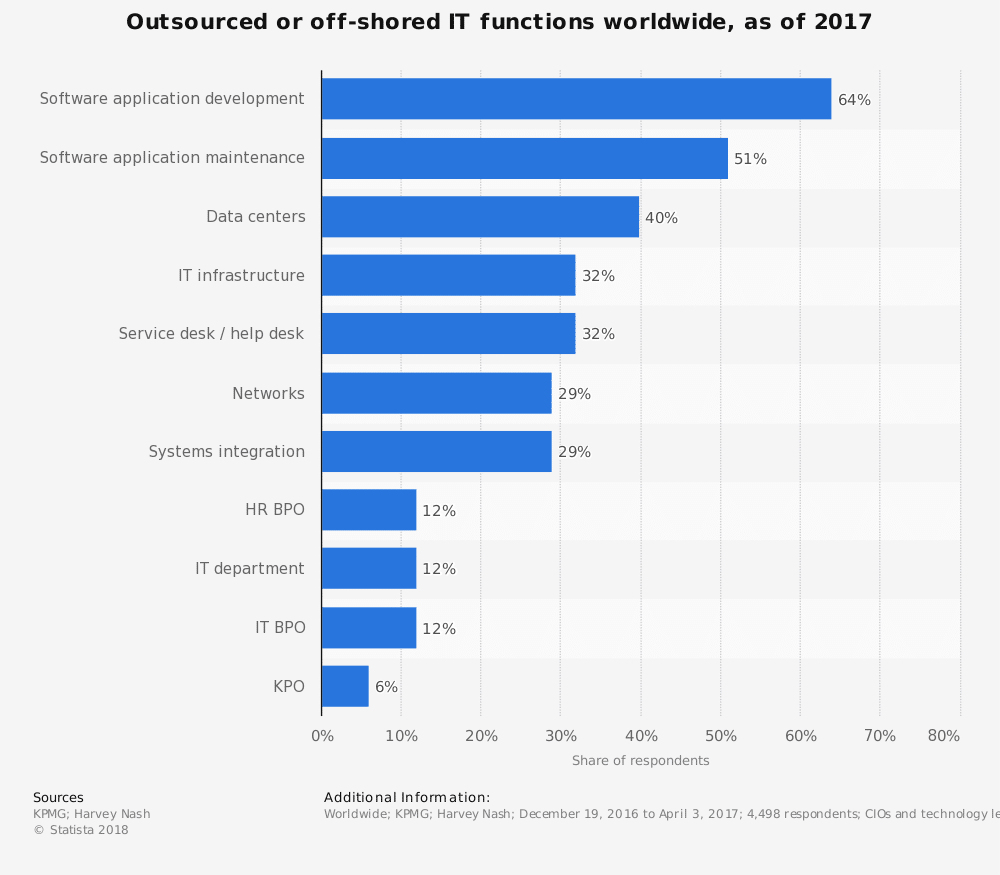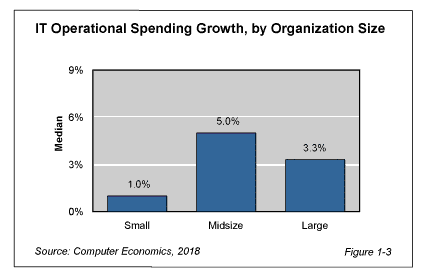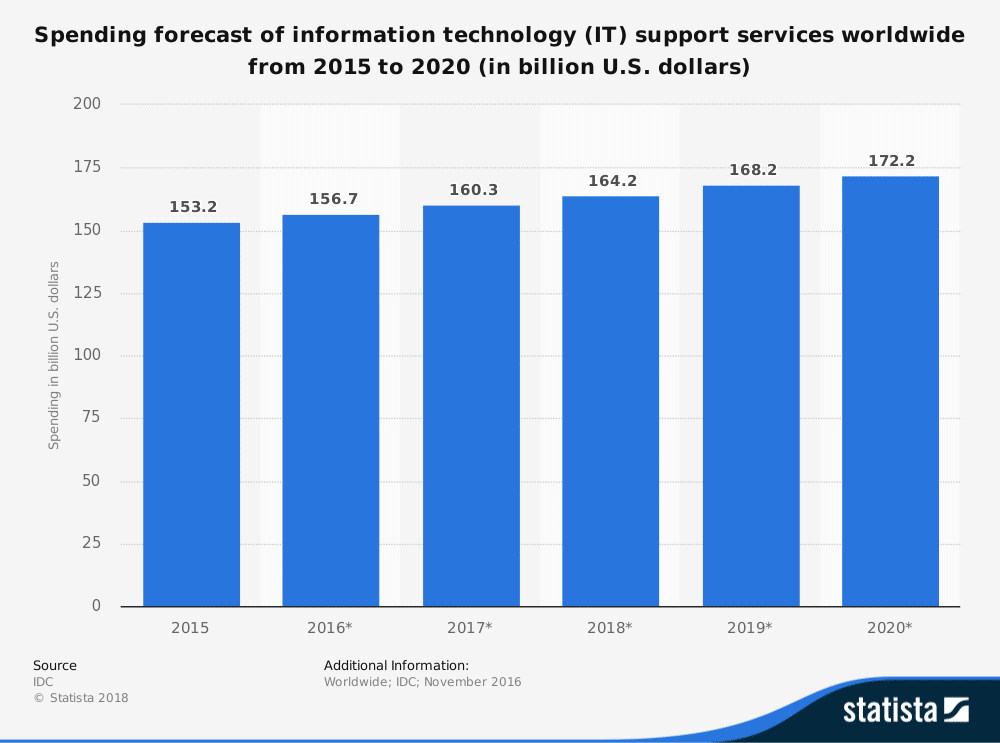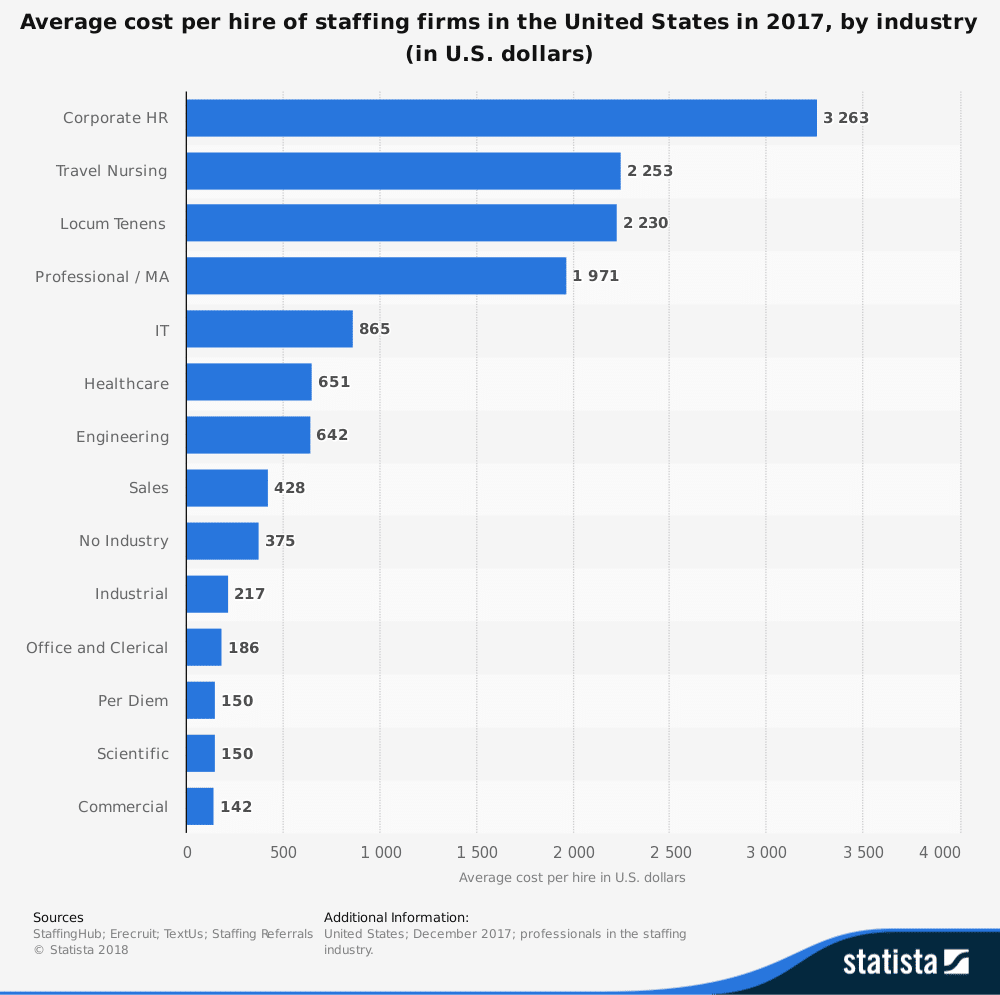IT Outsourcing and BPO for Managed Service Providers
Accelerate your path to business augmentation
Comparing to one of our first articles on outsourcing, and a follow up concerning outsourcing myths, the outsourcing industry today is considered as a prerequisite for growth. IT managed service providers are centers of excellence. They can optimize businesses with the highest efficiency, and have the capacity to lead companies through digital transformation.
Apart from that, the IT outsourcing industry has further developed regarding service and product diversity.
The global outsourcing market size in 2017 amounted to 88.9 billion U.S. dollars. IT outsourcing makes $64.3 billion, while business process outsourcing (BPO) earns $ 24.6 billion. The outsourcing trends for 2018 have predicted further growth of the business process outsourcing industry and IT outsourcing.
Roadmap to IT outsourcing
According to 451/Microsoft Research, 66% of the companies are either planning transformation, going through change or are positioning themselves as market leaders and makers.
When planning business transformation, the majority of companies singled out the following company goals:
- Increasing the revenue
- Lowering the costs
- Improving product and service quality
Among sales and marketing activities, hiring is among top 5 attributes to increasing revenue. Efficient business process creation and productivity enhancement are the most important in lowering the costs. Reducing headcount seems least beneficial to cost reduction.
A most important attribute to improve product or service quality is innovation, as well as finding, developing and retaining talent.
When assessing digital transformation readiness, most companies claim that they have a clear strategy on how to evolve their business. Companies also point out cloud specialist, cloud platform expertise and security expertise as top three cloud management skills lacking in workforce market today. Although they know where they want to be, companies are having challenges in finding the right talent to get them there.
The same research also showed that 52% of the organizations plan on working with service providers to obtain the needed IT expertise.
42% of the companies have recognized Managed Service Provider/Hosting provider services as ones having the capabilities to support companies through all stages of digital transformation and cloud enablement.
Managed Service Providers (MSP) as excellence centers
Most commonly outsourced IT function worldwide is software application development and maintenance, followed by data centers, IT infrastructure and help desk outsourcing.

According to 451/Microsoft Research, companies were considering using more of the following outsourcing services:
- Disaster recovery
- Premium 24/7 support services
- Incident management and remediation
- Enterprise mobility management services
- Enhanced service level agreement (covering infrastructure, application, etc.)
- Capacity planning services
We can expect further growth of the outsourcing market, especially in midsize company segment. Medium-sized companies are transitioning, with IT staff stretched to its limits, they are looking for improvements while downsizing the costs. The goal for most companies is to either outsource commodity IT functions or to outsource the most difficult challenges first (project-based approach).

When it comes to digital transformation, according to 451/Microsoft Research, more than 60% of the interviewed companies are planning on investing more in the following cloud services:
- Migration Services
- Assessment, Readiness and Enablement Services
- Transformation Services
Most sought after types of professional services from professional services cloud vendor in recent period are the following:
- Public Infrastructure as a Service Provider (IaaS)
- Cloud Enablement and Management Specialists
- Managed Service Provider/Managed Hosting
- Consulting/IT Outsourcing/Systems Integrator
- Independent Software Vendor (ISV)
Budgets and time spent on cloud projects are diverse, budgets leveling from minimum $1,000.00 to more than $2,000,000.00, and time from minimum 1-2 weeks to a timeframe that lasts more than 24 weeks.

These surveys justify 11% of annual growth in managed IT services that analysts expect in the next five years.
For MSPs, this means more focus and effort on building products, teams, and capabilities to support a very diverse spectrum of business requirements coming either as a one-time project or a continuing outsourcing service. To allow business growth for his business, an IT outsourcing vendor needs to ensure easy scalability of its product and services offering, while keeping up with needs of a customized approach to each company in respect to different industries.
Cloud and hosting providers are:
- Workforce productivity enablers
- Creators of more efficient or streamlined business process
- Able to monitor operations in real time
79% of the companies also predict that their IT budget is going to increase in the next two years. Their total yearly IT budgets in 2017 for 45% of the companies were ranging between $1 million to less than $10 million, while regular hosting/cloud providers costs for 47% of the companies make up between 2-4% of the IT budget total.
Leveraging the challenges from an MSP perspective
Apart from narrow specialization in a particular field of services or industry, managed service providers can leverage their issues by taking a more strategic approach when planning future growth. As it is the case with companies that are experiencing digital transformation, managed service providers themselves need to transform and optimize their business processes.
Essential factors in choosing an outsourcing provider for midsize businesses:
- 88 % of the leaders worldwide said communication was the primary driver of a successful outsourcing experience
- 56 % said service reliability is an essential factor
Managed service providers need to focus more on building relationships, offering solutions, marketing the projects, rather than operational excellence in all areas of service management. In a strategical sense, this opens up opportunities for MSP’s to outsource business processes related to service management workflow. Also, 80% of the companies stated that their current hosting/cloud service provider has partners or partner relationship needed to help the organization on its digital transformation journey.
Some of the processes MSP usually outsource today:
- Helpdesk support
- IT support in specific areas
- HR
- Accounting/Bookkeeping
- Website development and maintenance
- Marketing (as a whole or for certain parts of it such as SEO, copywriting or campaign management)

Each company decides to choose what and how much to outsource.
An MSP company can choose workflows worth outsourcing by examining them through a maturity model. A process is ready to be outsourced, once it reaches either a clean workflow phase. The other way of choosing a method for outsourcing is to select an under-developed or non-existing part or department of the business (i.e., outbound sales team in a company that hasn’t got an in-house SDR team). Trusting the outsourcing partner to employ best practices in designing workflows and team development that match business requirements is essential. With outsourced processes, one can focus on more specialized business requirements in a more project-based way, instead of managing day-to-day operations and management.
Some of the crucial details for choosing an outsourcing vendor are the following:
- Cultural alignment. It is vital that the outsourcing partner understands the client’s business environment (“bedside manner”)
- Scalability. An outsourcing partner needs to be able to scale quickly and efficiently to follow up on elasticity MSP’s provide for their clients
- Understanding who the end users are. A BPO vendor needs to be aware of who the MSP’s clients. Understanding the end user is the key to creating better user experience from each angle of the business process
- Familiarity with the technical and regulatory environment in which an MSP operates
- Ability to offer value-add. Outsourcing partners need to add something extra to the table as well (i.e., more productive workflow)
- Transparency. It is essential for BPO vendor to be transparent about its strengths and weaknesses.
Choosing a good outsourcing partner can sometimes cover more than one business process.
If choosing primarily a business process outsourcer, an MSP company can alleviate the challenges both in HR and in other processes (i.e., sales, help desk support ). BPO companies usually offer scalable staffing solutions accompanied by specialization in a specific field (or more fields).
Ensuring accountability means having a roadmap for managing the relationship with BPO and dedicating relationship owner on MSP end.
Conclusion
The same details decide in choosing an MSP provider for IT outsourcing service vendor as it is in selecting a BPO company to outsource MSP’s business processes.
The question today is not should we outsource or not, rather when to outsource and with whom. The competition on the MSP market is growing parallel to the rise of the budgets companies spend on IT projects. Time is the only commodity that can never be returned, once spent. Time can be spent on developing workflows or teams that might have been outsourced and optimized or, perhaps on scaling customer faced product strategy without having the operational burden of support workflows by partnering with a reliable partner that simply fits in.
A wise man will make more opportunities than he finds. – Francis Bacon
